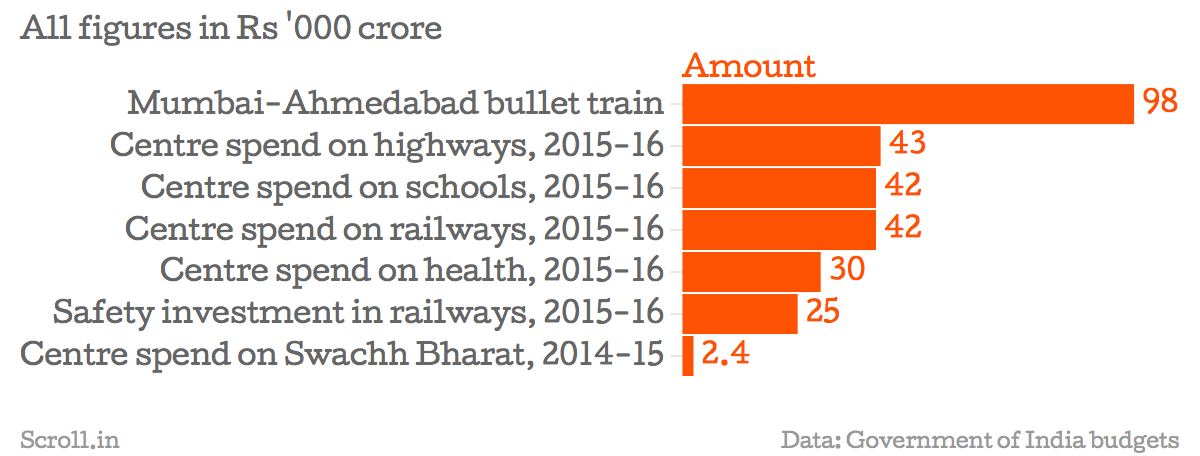Also read: Letters to the editor and the author's response
In every which way, Narendra Modi’s 2014 campaign was spectacular. From communication to ground management, the Bharatiya Janata Party electoral machine, it is widely acknowledged, got it right. However, a year and a half after Modi took office, one aspect of his campaign seems to have been a bit too spectacular altogether. As part of its manifesto, the BJP promised what it called a diamond quadrilateral: a network of bullet trains crisscrossing the country. The first step in that plan has gone through. India just signed a deal with Japan to build a Mumbai-Ahmedabad bullet train link.
Politicians overpromising things while campaigning is a fine Indian tradition but the enormous cost of just this one line should serve as a shock: the estimated project expenditure has come to Rs 98,000 crore.
To put that in perspective, here’s a chart of how this figure compares to other expenditure by the government of India on absolutely vital sectors such as rail safety, health, roads and schools.

Narendra Modi has made cleanliness a key part of his government’s message. And indeed, India desperately needs it being one of the countries with the worst rates of open defecation on the planet. 44% of Indians do not use what is probably the most basic marker of modernity: a toilet. Even Nepal, Pakistan and Bangladesh beat big brother India with corresponding figures of 32%, 13% and 1%, respectively.
India should be on a toilet overdrive, yet the government of India is going to spend 41X of its Swachh Bharat Mission outlay for 2014-'15 on building a somewhat fast train line between two cities already superbly connected by road, rail and air.
Bullet train > health, safety or schools
There’s more: the Mumbai-Ahmedabad bullet train cost is almost 4X the amount the Centre is going to invest in rail safety in 2015-16. Just a week ago, India saw two train accidents claim 14 lives and the Indian rail system is one of the most unsafe in the world. Yet, precious money is being diverted from safety to needless luxuries like a bullet train. In fact, shockingly, the bullet train budget is 2.4X the entire amount the government of India is going to spend on the Indian Railways in 2015-'16.
The Mumbai-Ahmedabad bullet train budget is also 2.3X the entire spend of the Centre on schools. The corresponding figure for health and highways is 3.3 and 2.3, respectively.
There is an interesting contrast here with healthcare. Like bullet trains, the BJP manifesto had also promised a plan for universal healthcare. This is much needed. India’s healthcare system is shambolic and according to a World Health Organisation study, ranks 112th in the world (for context, eastern neighbour Bangladesh ranks in at 88, a good 24 places ahead). Yet, in March 2015, the Modi government decided to scrap plans for a universal healthcare scheme due to a “constraint on India's financial resources”. This plan, which could have changed India dramatically, had a budget which was just 25% more than the Mumbai-Ahmedabad bullet train link.
The razzmatazz of a bullet train might help him politically but can Prime Minister Narendra Modi justify reducing the Mumbai-Ahmedabad commute by two hours as a more important public goal than rail safety, ending open defecation, schooling, building highways across the country or public health?
Also read: Letters to the editor and the author's response










